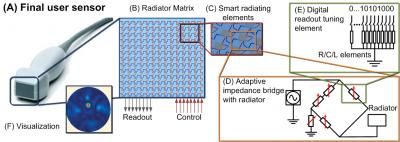Integrated Near Field sensOrs for high Resolution MicrowavE spectRoscopy
Publications
- Miniaturized Broadband Microwave Permittivity Sensing for Biomedical Applications
G. Vlachogiannakis; Z. Hu; H. T. Shivamurthy; A. Neto; M. A. P. Pertijs; M. Spirito; L. C. N. de Vreede;
IEEE Journal of Electromagnetics, RF and Microwaves in Medicine and Biology,
Volume 3, Issue 1, pp. 48--55, March 2019. DOI: 10.1109/JERM.2018.2882564
Abstract: ...
A compact sensing pixel for the determination of the localized complex permittivity at microwave frequencies is proposed. Implemented in the 40-nm CMOS, the architecture comprises a square patch, interfaced to the material-under-test sample, that provides permittivity-dependent admittance. The patch admittance is read out by embedding the patch in a double-balanced, RF-driven Wheatstone bridge. The bridge is cascaded by a linear, low-intermediate frequency switching downconversion mixer, and is driven by a square wave that allows simultaneous characterization of multiple harmonics, thus increasing measurement speed and extending the frequency range of operation. In order to allow complex permittivity measurement, a calibration procedure has been developed for the sensor. Measurement results of liquids show good agreement with theoretical values, and the measured relative permittivity resolution is better than 0.3 over a 0.1-10-GHz range. The proposed implementation features a measurement speed of 1 ms and occupies an active area of 0.15x0.3 mm², allowing for future compact arrays of multiple sensors that facilitate 2-D dielectric imaging based on permittivity contrast. - A 40-nm CMOS Complex Permittivity Sensing Pixel for Material Characterization at Microwave Frequencies
G. Vlachogiannakis; M. A. P. Pertijs; M. Spirito; L. C. N. de Vreede;
IEEE Transactions on Microwave Theory and Techniques,
Volume 66, Issue 3, pp. 1619-1634, March 2018. DOI: 10.1109/tmtt.2017.2753228
Abstract: ...
A compact sensing pixel for the determination of the localized complex permittivity at microwave frequencies is proposed. Implemented in the 40-nm CMOS, the architecture comprises a square patch, interfaced to the material-under-test sample, that provides permittivity-dependent admittance. The patch admittance is read out by embedding the patch in a double-balanced, RF-driven Wheatstone bridge. The bridge is cascaded by a linear, low-intermediate frequency switching downconversion mixer, and is driven by a square wave that allows simultaneous characterization of multiple harmonics, thus increasing measurement speed and extending the frequency range of operation. In order to allow complex permittivity measurement, a calibration procedure has been developed for the sensor. Measurement results of liquids show good agreement with theoretical values, and the measured relative permittivity resolution is better than 0.3 over a 0.1-10-GHz range. The proposed implementation features a measurement speed of 1 ms and occupies an active area of 0.15x0.3 mm², allowing for future compact arrays of multiple sensors that facilitate 2-D dielectric imaging based on permittivity contrast. - A 5x5 Microwave Permittivity Sensor Matrix in 0.14-μm CMOS
Z. Hu; G. Vlachogiannakis; M. A. P. Pertijs; L. C. N. de Vreede; M. Spirito;
In Proc. IEEE MTT-S International Microwave Symposium (IMS),
6 2018. DOI: 10.1109/MWSYM.2018.8439438 - A Compact Energy Efficient CMOS Permittivity Sensor Based on Multi-Harmonic Downconversion and Tunable Impedance Bridge
G. Vlachogiannakis; Z. Hu; H. T. Shivamurthy; A. Neto; M. A. P. Pertijs; L. C. N. de Vreede; M. Spirito;
In Int. Microwave Biomedical Conference (IMBioC),
pp. 1--3, June 2018. DOI: 10.1109/IMBIOC.2018.8428950
Abstract: ...
This paper presents a 0.15×0.3 mm2 complex permittivity sensor integrated in a 40-nm CMOS node. A single-ended patch, employed as a near-field sensing element, is integrated with a double-balanced, fully-differential tunable impedance bridge that is driven by a square RF pulse. The multi-harmonic, intermediate-frequency down-conversion architecture achieves a compact form factor and fast multi-frequency readout. Measurement results show good agreement with theoretical values and the measured relative permittivity variation remains below 0.3 over a 0.1-10 GHz range at a 1-ms measurement time. The energy efficiency resulting from the fast measurement time and the record-small active area allows integration in battery-operated wearables. - A 40-nm CMOS permittivity sensor for chemical/biological material characterization at RF/microwave frequencies
G. Vlachogiannakis; M. Spirito; M. A. P. Pertijs; L. C. N. de Vreede;
In Proc. IEEE MTT-S International Microwave Symposium (IMS),
IEEE, pp. 1‒4, May 2016. DOI: 10.1109/mwsym.2016.7540260
BibTeX support
